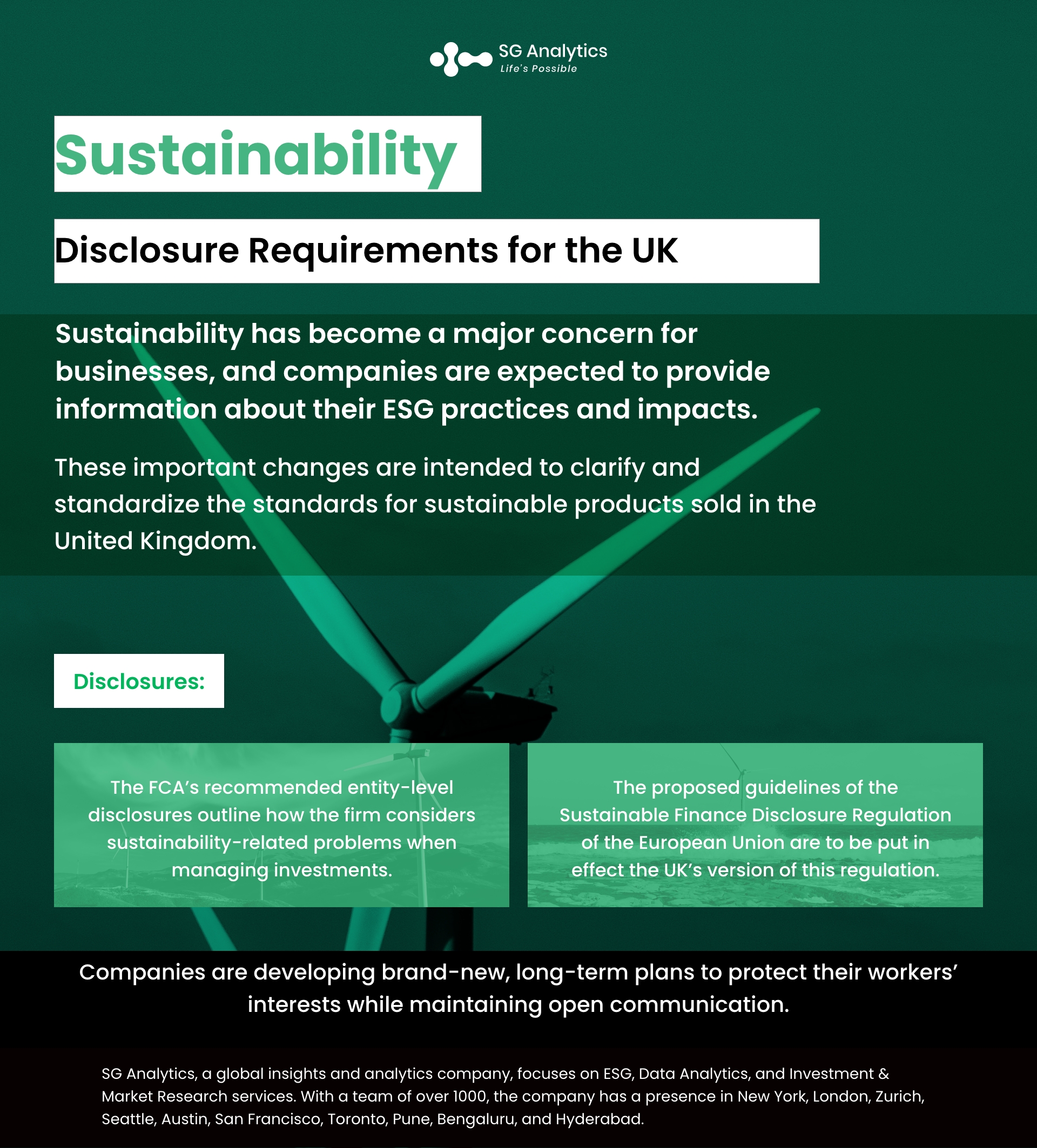The Financial Conduct Authority has released preliminary guidelines for the United Kingdom's new sustainability disclosure rules and investment labelling system, which is currently in the consultation phase.
The Sustainable Finance Disclosure Regulation of the European Union has been in effect for some time; the proposed guidelines of the consultation would put into effect the UK's version of this regulation. The purpose of the new guidelines is to make the United Kingdom "a trusted center for sustainable investment and a global leader in sustainable investment." The SDRs intend to accomplish this by "establishing stringent regulatory criteria to protect consumers, which raise the bar and establish a solid platform for sustainable investment products."
In its consultation, the FCA notes, "We propose to implement a suite of measures aimed at preventing greenwashing. This consists of sustainable investment labelling, transparency regulations, and limitations on the use of sustainability-related words in product branding and marketing." The FCA asserts that it intends to "bring better openness, consistency, and consequently trust in the market for sustainable investment solutions."
Focusing on asset managers and their fund products and portfolio management services operating in the United Kingdom, the consultation paper outlines key SDR aspects.

UK's Requirements for Sustainability
Sustainability has become a major concern for businesses in recent years, and companies are increasingly expected to provide information about their environmental, social and governance (ESG) practices and impacts. In the United Kingdom, there are a number of sustainability disclosure requirements that companies need to be aware of. In this blog, we will take a closer look at the UK's sustainability disclosure requirements and what they mean for companies.
A new framework intends to expand sustainability reporting and incorporate double materiality, but its path to becoming legislation is lengthy. The United Kingdom's Sustainability Disclosure Requirements (SDRs) aim to standardize and streamline the sustainability reporting processes for businesses and financial institutions.
According to briefing documents, they were prepared by HM Treasury, the Department of Business, and the Department of Work and Pensions to address "the next stage in placing the United Kingdom's financial sector in a better position to accomplish the aims of the Paris Agreement."
Importantly, SDRs could someday provide asset owners with a comprehensive understanding of the environmental and social implications of the companies in their portfolios. However, SDRs face a lengthy wait for legislative approval, and feedback from stakeholders may result in modifications. In this article, ESG Investor examines the initiative's current status, future plans, and consequences for investors.

Detailed UK proposals
These important changes are intended to clarify and standardize the standards for sustainable products sold in the United Kingdom. Sustainable investment labelling, stringent disclosure standards, name and marketing regulations, distributor restrictions, and an overarching anti-greenwashing rule are all on the horizon.
The UK's standards for the use of sustainable investment labels, as well as the disclosure requirements associated with those labels, are substantial and well-thought-out. The labels are voluntary; nonetheless, failing to comply with them may result in legal action and/or limitations on how you can describe your product in terms of environmental friendliness.
We'll take a closer look at each of these preconditions and offer some insight into what it all means in reality down below. For the time being, the FCA is emphasizing that these measures do not apply to foreign funds being sold in the United Kingdom, but that it will hold a consultation to expand the regime to include such products in the near future. Managers of funds based outside the United Kingdom can anticipate that the United Kingdom will treat the extraterritoriality of these standards in the same manner as the European Union's Solvency II Regulatory Technical Standards (EU SFDR).
While the FCA has made efforts to keep this regime as straightforward as possible, the length of this summary briefing provides some indication of the complexity and effort that may be required by some businesses to meet these standards. There will also be an overlap between the European Union and the United Kingdom's regulatory framework, which could lead to unnecessary work for both organizations. In order to have a say in the final rules, which are expected to be issued in H1 2023, businesses (even those not currently in scope) should familiarize themselves with the ideas as soon as possible.

Disclosures
The FCA's recommended entity-level disclosures outlining how the firm considers sustainability-related problems when managing investments on behalf of clients and consumers are based on the framework established by the Task Force on Climate-related Financial Disclosures. This is to ensure that they continue to comply with the International Sustainability Standards Board's requirements.
The FCA acknowledges that this approach means that the entity-level disclosure obligations are not fully harmonized with EU SFDR or US fund adviser standards. The fundamental difference is that the FCA does not require notice of significant adverse consequences. Instead, it anticipates revising disclosure regulations as needed to align with the implementation of more clear ISSB criteria.
Specifically, the FCA recommends that, so long as the cross-referencing and other standards described in the consultation are met, companies may include entity-level disclosures in a group or affiliate report that also incorporates other sustainability-related disclosures. In addition, they must include a statement of compliance attesting that the firm's disclosures comply with FCA standards.
The FCA does not propose to develop pre-contractual, online, and periodic disclosure templates for the SDRs, contrary to the EU SFDR. Instead, it "encourages" each industry to do so if there are financial benefits. A number of disclosure features mandated by the EU SFDR are not recommended by the FCA for the new system in the United Kingdom.
The FCA requested comments on the proposed new rule by January 25. It expects to produce a policy statement with the final rules by the end of June of this year. Moreover, the FCA intends to expand the regime through future consultations on foreign and pension products. Obviously, this field is in a state of perpetual flux, and change is inevitable.
Also Read - How Businesses Can Improve Their Sustainability Performance With ESG

Building a Greener and Sustainable Future
Before 2023, accountability was seen as pleasant, but that's starting to change. The epidemic refocused attention on sustainability and clean energy. Sustainability, which was previously an overarching issue, is now a key focus for every company. This presents a unique chance for businesses to evaluate their current state and consider how they could reduce their carbon footprint in the near and far future.
There is an increasing effort by companies of all kinds to combat the effects of climate change. They no longer include it in the brand's mission statement, but it has become a unifying notion that drives them to carry out essential tasks.
Companies are developing brand-new, long-term plans. They are stepping up their efforts to lessen their environmental impact by using cutting-edge machinery. This allows them to protect their workers' interests while maintaining open communication. By 2023, brands that need to put sustainability first will have already lost the race.
With a presence in New York, San Francisco, Austin, Seattle, Toronto, London, Zurich, Pune, Bengaluru, and Hyderabad, SG Analytics, a pioneer in Research and Analytics, offers tailor-made services to enterprises worldwide.
SG Analytics is an industry leader in ESG services, providing custom sustainability advice and research to aid in deliberation. If you are looking for an effective ESG integration and management solution provider to improve your company's long-term viability, get in touch with us today.

FAQ
What are SDRs, and why are they being introduced?
In his yearly City of London address in July 2021, Chancellor of the Exchequer Rishi Sunak referenced SDRs for the first time. Following Brexit, they were expected to usher in a new era for the UK's financial services industry, with implications for businesses, pension funds, and other providers at both the entity and product levels.
Sustainability Disclosure Requirements were developed with the intention of expanding the scope of UK sustainability reporting beyond its current emphasis on climate-related risks. While the United Kingdom (UK) has built its climate reporting framework on the TCFD's recommendations, SDRs go further by mandating double materiality and by considering additional environmental impacts and risks in addition to those deriving from climate change.
With the help of SDRs, a unified system for disclosing sustainability information that can inform economic decisions will be established. The government claims this will allow for the free flow of comparable data on the impact and influence of corporate and financial flows on sustainability criteria.
How will SDRs impact sustainability information flows for asset managers and owners?
If the SDRs foreshadow the onset of double materiality, this will undoubtedly alter the character of reporting requirements. The phrase "double materiality" is used in the context of reporting to describe the importance of including information about both the internal effects of sustainability issues on a company and the external effects of the company's activities on societal and environmental sustainability.

Others, such as certain significant asset owners, see reporting outside of financial materiality as crucial to achieving sustainability goals, while others in the sector see it as an unnecessary burden. Though many would welcome an increased focus on double materiality, quantifying its actual effect is challenging.
While twofold materiality is a cornerstone of the European Union's reporting system for sustainable investment, its impact in the United Kingdom is less certain until the Financial Conduct Authority's consultation process concludes.
Why are SDRs a departure from existing disclosure requirements?
The most significant shift brought about by the SDR is not its broader applicability but rather its double materiality. In the words of Warwick Thompson, this new outlook has the ability to counteract the tendency towards a myopic approach to issues of environmental and sustainable development.
UKSIF, in its response to the FCA's Discussion Paper, argued for a more consistent approach to reporting obligations for "green funds" by avoiding some of the shortcomings of the EU Sustainable Finance Disclosure Regulation (SFDR). This is due to the fact that the SDR regime imposes new reporting and labelling obligations on the corporations whose stocks and bonds are held by UK-registered funds.









